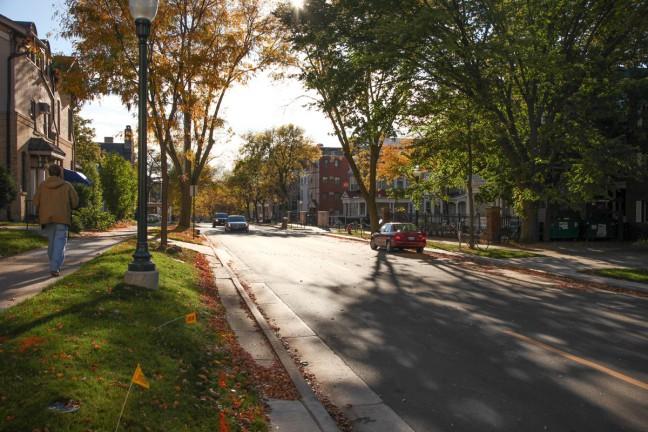University of Wisconsin’s chapter of the Sigma Alpha Epsilon fraternity was suspended Tuesday from all university activities until Nov. 1, 2016.
The five-and-a-half month suspension is in response to a complaint filed March 3, 2016 from a student member who alleged there was a “hostile, discriminatory environment” from 2014 to early 2016, according to a UW statement.
The student claimed that several incidents occurred over an 18 month period before the complaint was filed, including racial, anti-gay and anti-Semitic slurs directed at multiple students, according to a timeline of the events.
During one incident on Oct. 31, 2014, a fellow member of the fraternity addressed the student who filed the complaint by a racial slur and then choked him for about five seconds until other members intervened, according to the timeline.
For the member who choked the victim, the chapter’s Judicial Board implemented “sober monitoring” during events and prevented him from attending a formal, according to the timeline. The member graduated in December 2014.
Chapter leaders said they were not told about the racial nature of the event at the time and no criminal report was filed, according to the timeline.
In another incident in March 2015, an SAE member ran down State Street yelling a racial slur. The member was expelled, but was still present at times at the chapter house.
The Committee on Student Organizations, which investigated the allegations against SAE and issued the suspension, determined that SAE board members addressed the October 2014 incident to their “fullest capability” based on the information they had, according to the CSO decision. CSO also found that SAE did take action in response to some of the other complaints.
CSO found, however, that the overall environment was not improved, and that the discrimination could be attributed to SAE as a whole, according to CSO’s decision on the case.
Chancellor Rebecca Blank sent a letter to Blaine Ayers, SAE’s national office executive director, requesting that more work be done to achieve a safe environment. Blank said SAE’s discriminatory actions do not fit with UW’s commitment to diversity and inclusivity.
“I am deeply disappointed in the chapter’s failure to address persistent reports of discriminatory behavior, as well as the national body’s inability to address discrimination within its chapters,” Blank wrote in the letter.
The SAE chapter at University of Oklahoma was shut down in March 2015 after a video surfaced of its members reciting a racist chant that they learned at a national SAE leadership event, according to The Washington Post.
After the Oklahoma incident, SAE’s national office required training for all of its chapters, including UW’s, but behavior not in line with UW’s values still occurred, UW spokesperson Meredith McGlone said.
Blank wrote that racial incidents like those in Oklahoma still clearly persist within SAE. She said she hopes to arrange a meeting with the SAE national president and the local chapter president before SAE is reinstated in the fall.
CSO is also requiring the Wisconsin chapter of SAE to have additional training on discrimination, inclusion and general health and safety before it can be reinstated, according to the letter. If the trainings are not completed, the suspension will be extended, according to CSO’s decision.
McGlone said the goal of these trainings is to improve SAE’s racial climate in the future.
“[The CSO] is interested in changing behavior and making sure organizations come out of an incident stronger so problems are less likely to occur in the future,” McGlone said.
SAE was suspended for five semesters in 2006 after a complaint surfaced after a Halloween party that resulted in 266 citations, fire code violations and $94,000 in fines.
The contents of the complaint, however, have never been released. SAE returned to campus in 2009.
McGlone said it is important for students to continue to speak up and report when they witness or experience discrimination.
“Behaviors that are unwelcoming, that are discriminatory, that’s what creates a bad campus atmosphere,” McGlone said. “People pretending like it’s not happening is not going to help fix it.”
This post will be updated as more information is released.


